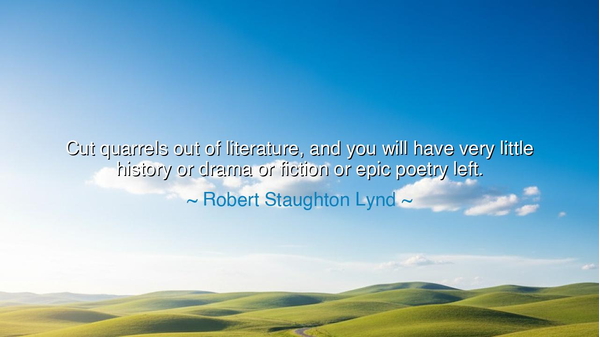
Cut quarrels out of literature, and you will have very little
Cut quarrels out of literature, and you will have very little history or drama or fiction or epic poetry left.






Hear the wise words of Robert Staughton Lynd, who once proclaimed: “Cut quarrels out of literature, and you will have very little history or drama or fiction or epic poetry left.” In this statement lies a profound observation on the nature of human storytelling. For what is a tale without conflict? What is history without struggle? What is drama without opposing wills? The seed of narrative is strife, and the blossoming of art is born from the soil of discord.
The meaning is clear: the essence of literature is not found in harmony alone, but in the clash of forces—within men, between men, and between men and the universe itself. Without quarrels, stories lose their pulse, for they no longer reflect the turbulent heart of humanity. Conflict is the spark that ignites the flame of imagination, the test that reveals character, the crucible in which truth and falsehood are weighed.
Consider the Iliad, that ancient epic sung through centuries. It is a tale woven almost entirely from quarrels—between gods, between nations, between warriors, and even within the soul of Achilles himself. Remove the strife, and nothing remains but hollow names and lifeless praise. But because of the quarrels, we see bravery, pride, rage, grief, and the very marrow of the human condition. Thus, quarrel is not destruction in literature—it is revelation.
History too proves the same. The chronicles of nations are not long lists of peace, but the record of conflict—wars that shaped borders, revolutions that gave birth to freedom, debates that redefined justice. Without the quarrels of past ages, history would be a silence, a blank page. And though such struggles brought pain, they also brought progress. Out of quarrel came liberty, reform, and transformation.
Even in fiction and drama, the greatest works are steeped in quarrels of the spirit. Shakespeare’s plays are filled with feuds, betrayals, rivalries, and inner torment. Hamlet’s indecision, Macbeth’s ambition, Othello’s jealousy—all are quarrels within the soul that spill into the world. Remove them, and what remains is no drama at all, only shadows of men without struggle or growth.
The lesson is this: do not fear conflict in stories, nor in life. For it is often through quarrel that truth is revealed and character is formed. To read literature is to confront struggle, to see how others have battled, and to learn how we might endure our own trials. To live without quarrel would be to live without the fire that tempers us into who we are.
Practical steps follow: when reading, look for the quarrel at the heart of the story—ask, What is the struggle here? What truth emerges from it? When writing, do not shy away from conflict, for it is the lifeblood of narrative. And in life, when quarrel comes, see it not only as burden but as teacher, a moment where strength and wisdom may grow.
Thus, the words of Lynd endure: “Cut quarrels out of literature, and you will have very little history or drama or fiction or epic poetry left.” Let them remind us that the stories of humanity, whether sung by poets or lived in the flesh, are shaped not in the stillness of peace, but in the storms of struggle. And it is from these storms that our greatest truths are born.






MTPHUNG MINH THU
I find this statement both witty and profound. It suggests that quarrels aren’t just drama—they’re the essence of human expression. Without disagreement, there would be no motivation, no plot, no catharsis. But it also makes me question: do we overvalue conflict in art? Could literature evolve to focus more on resolution, harmony, or empathy instead? Maybe we’re conditioned to equate tension with depth, when peace might be just as complex.
LKLien Kim
This quote makes a lot of sense when you think about how stories are structured. Every great novel, play, or poem seems to revolve around some kind of clash—between people, beliefs, or even within the self. It’s almost as if conflict is the heartbeat of literature. But it’s also a bit sad to realize that we rely so heavily on discord for meaning. Does that say something about storytelling—or about human nature itself?
VPUy Vu 7/7 vip pro
I really like this perspective—it’s a reminder that art thrives on friction. Whether it’s internal conflict or an epic rivalry, quarrels push characters and ideas to evolve. Still, it makes me wonder if literature could ever exist without conflict at its core. Could there be compelling stories centered purely on cooperation, joy, or understanding? Maybe it’s possible, but perhaps they’d feel more like reflections or meditations than narratives.
ATAnh trinh
This observation is fascinating because it highlights how deeply conflict drives storytelling. Without tension or disagreement, what would be left to engage the reader? It makes me think that literature, in many ways, mirrors human nature—our struggles, debates, and opposing desires. But it also raises a question: does that mean peace and harmony are inherently less interesting to us as readers? Or are we simply drawn to conflict because it reveals truth and transformation?